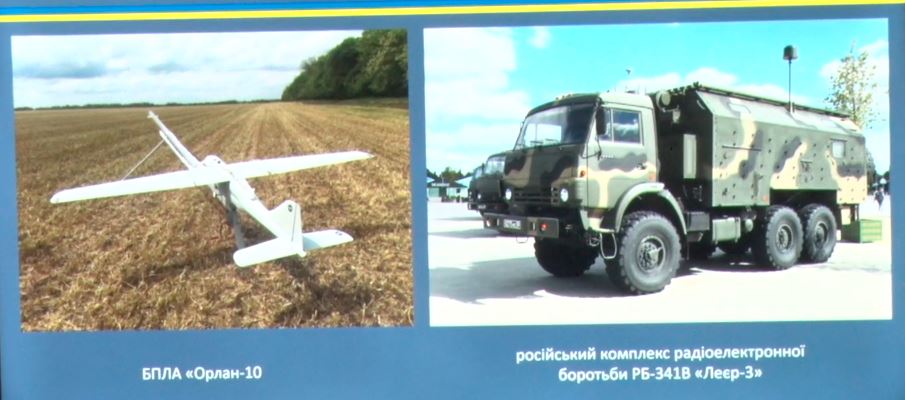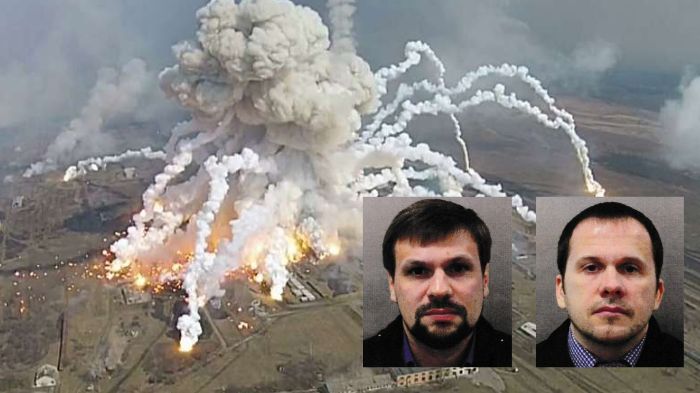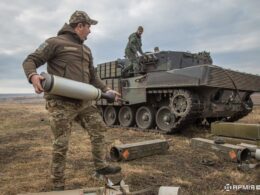Ukraine's intelligence services claim to have uncovered evidence of a years-long Russian effort to sabotage military sites inside Ukraine and even within NATO borders.
The State Bureau of Investigation (DBR), Security Service, and Prosecutor General's Office announced Friday they have named 50 operatives from Russia's special forces in connection with two major explosions in 2014 and 2015 that destroyed stockpiles of weapons intended for Ukraine's military.
The first incident came in October 2014, when a series of blasts ripped through an ammunition depot in Vrbetice, Czech Republic, that was storing tons of artillery shells destined for Ukraine's armed forces fighting Russian-backed separatists in the Donbas. Two Czech nationals were killed in the unexplained explosions.
Explosions in Svatove
Barely a year later, in October 2015, Ukraine directly suffered a devastating blow when missiles and artillery rounds stored at a depot in Svatove, in Ukraine's easternmost Luhansk Oblast, detonated, killing three soldiers.
According to the Ukrainian investigation, the blasts, conducted on the Kremlin's orders, were triggered remotely using drones by an elite team of Russian military intelligence (GRU) saboteurs, including two men wanted for the poisoning of Sergei Skripal in Britain, Aleksandr Mishkin and Anatoliy Chepiga.

The attacks succeeded in destroying stored missiles and shells as fighting raged at critical battles, investigators said.
Based on the evidence collected, both suspects and another 25 members of Russia's special operations forces, as well as their accomplices from the militants of Russia's puppet Luhansk and Donetsk "People's Republics" ("LDNR") have been notified of suspicion of sabotage.
According to the investigation, to blow up the arsenal, the Russian special forces used the Leer-3 electronic warfare complex with three Orlan-10 drones.

On 29 October 2015, this weaponry was moved from the temporarily occupied Donetsk to the forward positions of the "LDNR" militants near the town of Pervomaisk in Luhansk Oblast.
From there, the aggressor launched drones towards Ukraine's military depot in Svatove. As they approached the facility, the Russian drones dropped incendiary grenades with a parachute system.
As a result of the enemy hit, all ammunition stored there detonated.
Due to the explosions and detonations, 76 units of military equipment, and over 3,000 tons of missiles and ammunition were destroyed, with Ukraine suffering over $4.5 mn in material damage. Three servicemen and one civilian were killed.
The version of this GRU group's involvement in explosions at other military depots in Ukraine and abroad is now being developed.
Who is charged
So far, 25 Russian nationals have been notified they are suspects in the case. More may follow as the investigation continues into whether the same team was behind other blasts.
Apart from Chepiga and Mishkin, among those charged are Igor Sergun, former head of the Main Intelligence Directorate of Russia's General Staff until 2016; Alexey Dyumin, a former Putin bodyguard who became Russian Deputy Defense Minister in 2015; and Maj. Gen. Valery Vyacheslavovich Frolov, commander of Russian special forces.
Also implicated is Maj. Gen. Andrey Averyanov, who heads the GRU's 161st Special Purpose Specialist Training Center. According to the DBR, Averyanov is part of Putin's inner circle and frequently attends high-level official meetings.
The DBR statement alleges a Ukrainian citizen code-named "Start," who joined the "Luhansk People's Republic" militants in 2014 before working for Russian intelligence, piloted the drone that dropped explosives on Svatove.
According to the investigation, more than 50 active servicemen of the Russian General Staff who carried out sabotage in Ukraine and the EU, and possibly continue to do so now, will also be notified of suspicion after all examinations are completed.
Chepiga and Mishkin behind 2014 blasts in Czech Republic
In 2021, Czech authorities revealed GRU agents Chepiga and Mishkin were behind 2014 explosions at Czech arms depots that killed two people and destroyed 150 tons of munitions. The operation was reportedly directed by Averyanov, who also traveled to the Czech Republic on forged documents.
Investigative reporting found that the ammunition stored in Vrbětice was allegedly intended to be transported to Ukraine for use against Russia-led militants in Donbas. The depots were operated by Bulgarian arms dealer Emiliyan Gebrev, who himself had been poisoned in 2015, reportedly by the Russian GRU military intelligence agency. Gebrev's arms depots in Bulgaria also suffered explosions between 2011-2022 linked to the GRU.
Czech officials claimed the ammo was only meant to transit through Czech territory before being transported on to Bulgaria, but Gebrev's company denied it was ultimately headed to Ukraine or Syria. Further investigations revealed Gebrev's company was one of only two in the EU producing ammunition compatible with Soviet-era arms that Ukraine desperately needed.
It's believed the GRU orchestrated the Czech depot explosions as part of a broader operation to disrupt Ukraine's weapons supply during the conflict. Six GRU officers, including some operating under diplomatic cover identities, allegedly took part in the depot operation.
Related:
- Insider: Deported Moldova Sputnik chief revealed as career GRU spy
- Ukrainian hackers get access to Russian top-ranking intel officer’s email





